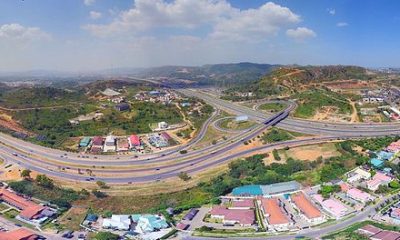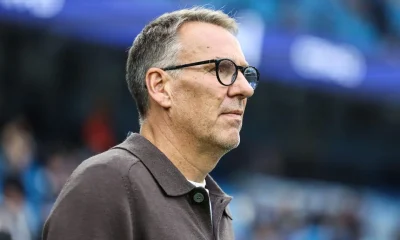News
Many Nigerians believe breast cancer caused by spiritual attacks, witchcraft – Expert shares insights
The World Health Organisation, WHO, has warned of a rising cancer burden. Breast cancer remains the most common cancer among women in Nigeria, with many myths, cultural perceptions, and structural barriers hindering early detection and treatment.
In this exclusive interview with us, Dr Nwamaka Lasebikan, Director of Research and Innovation at the National Institute for Cancer Research and Treatment, NICRAT, shares insights. Excerpts:
Breast Cancer awareness in Nigeria
She had this to say: “Breast cancer remains the most common cancer among women in Nigeria, yet many myths, cultural perceptions, and structural barriers hinder early detection and treatment. Misinformation about breast cancer is widespread in Nigeria, and it often leads to delayed diagnosis and poor treatment outcomes.
One of the most common myths include that ‘breast cancer is caused by spiritual attacks or witchcraft.’ Many believe cancer is a punishment or an attack from spiritual forces. This misconception discourages people from seeking medical care and instead relying on traditional healers. Breast cancer is a biological disease, not a spiritual affliction.
Some also erroneously say ‘If I don’t feel pain, it’s not cancer.’ However, most early-stage breast cancers are painless. Waiting for pain before seeking medical help can lead to late-stage diagnosis.
There are many who believe that ‘breast cancer means automatic death.’ This belief stems from the fact that many cases in Nigeria are diagnosed at stage 3 or 4, when treatment options are limited. However, early detection through clinical breast exams, ultrasounds, and mammograms significantly improves survival rates.
There’s also this wrong notion that ‘Only women get breast cancer.’ While much less common, men can also develop breast cancer, and stigma often prevents them from seeking help.
Meanwhile, to some certain people, it’s believed that ‘Squeezing or touching the breast too much causes cancer.’ However, there is no scientific evidence that breast stimulation causes cancer.
Addressing these misconceptions through community outreach, media campaigns, and culturally sensitive education programs is crucial to improving early diagnosis and treatment outcomes in Nigeria”.
Most common risk factors for developing breast cancer
According to the medical expert, “Breast cancer risk factors include a mix of biological, environmental, and lifestyle influences.
The risk increases with age, but younger women (30s–40s) are increasingly being diagnosed.
Family history and genetics is also a factor. A strong family history of breast cancer raises the risk, especially if a mother, sister, or aunt has had the disease, i.e. first degree relative.
Women who have their first child after 30 or have never given birth have a higher risk due to prolonged exposure to estrogen.
Lack of breastfeeding is a risk factor too. Breastfeeding reduces risk by lowering estrogen levels, but many urban women are opting for shorter breastfeeding periods.
Then you talk of obesity and poor diet. It’s important to stress here that high consumption of processed foods, trans fats, and sugary drinks is a growing problem in Nigeria, increasing cancer risk.
In addition, alcohol and smoking – as lifestyle factors, once uncommon in Nigerian women – are becoming more prevalent and contributing to increased cases.
Another risk factor is exposure to environmental toxins. Nigeria has poor waste management and industrial pollution, leading to increased exposure to carcinogenic chemicals that can affect breast tissue.
So, understanding these risk factors enables individuals to make proactive lifestyle changes and prioritize regular screenings.”
Does breast cancer have anything to do with genetics?
Yes, genetics plays a role, but not all breast cancers are hereditary.
In Nigeria, about 5–10% of breast cancer cases are due to inherited genetic mutations, mainly BRCA1 and BRCA2.
Genetic testing is not widely available or affordable, meaning many high-risk individuals are unaware of their genetic predisposition.
A family history of breast cancer, especially in a first-degree relative (mother, sister, daughter), increases risk significantly.
There is growing evidence that African and Nigerian women may have unique genetic risk factors, which require more research and investment in genomic medicine.
For women with a strong family history, early screening (clinical breast exams, ultrasounds, and mammograms) from age 30 is advised. Genetic counseling should be integrated into oncology care in Nigeria to help high-risk individuals make informed decisions. At NICRAT, we are working to understand the genetic drivers of breast cancer in Nigerian women.
Are there specific lifestyle changes or diets that can help reduce the risk of breast cancer?
Yes! While no lifestyle choice guarantees prevention, certain habits can significantly lower the risk.
Eat a balanced, plant-based diet. Increase vegetables, fruits, whole grains, legumes, nuts, and foods rich in antioxidants. Reduce processed meats, deep-fried foods, and high-sugar diets, which contribute to obesity and inflammation.
Also, it’s important that one maintains a healthy weight. Obesity, especially after menopause, increases estrogen levels, raising breast cancer risk. Exercising regularly can also help. At least 150 minutes of moderate physical activity per week lowers hormone-related cancer risks.
In addition to the above, one should limit alcohol consumption. This is because even moderate alcohol intake increases breast cancer risk.
Then again, women should breastfeed if possible – prolonged breastfeeding (>1 year) lowers risk, and avoid smoking and exposure to harmful chemicals.
Meanwhile, many Nigerian women use skin-lightening creams containing harmful chemicals, which may have long-term carcinogenic effects. Therefore, investing in health education programs to encourage lifestyle modifications should be prioritized at the national level.
At what age should women start getting regular mammograms?
For women at average risk: Start mammograms at age 40, then every 1–2 years.
For high-risk women (e.g., family history, BRCA mutations, previous chest radiation): Screening should begin as early as 30 years, often with ultrasound and MRI before mammography.
Attempts are being made to provide breast screening programs and integrate ultrasound-based detection, which is more accessible.
Raising awareness about clinical breast exams and self-breast awareness remains critical.
How can family members and friends best support someone going through breast cancer treatment?
Following a diagnosis of breast cancer, many women are anxious and emotionally unstable. Offering emotional support, encouragement without judgment or pity, being present are what matters more than words. Provide them with this pillar of support all through their cancer journey from diagnosis to treatment and post treatment.
Other ways to support is by assisting with hospital visits, cooking, and childcare.
Breast cancer treatment is expensive, and many patients struggle with out-of-pocket costs. Family crowdfunding can help.
Encourage adherence to treatment. Many patients abandon chemotherapy either due to side effects, financial constraints, or cultural beliefs.
Avoid harmful statements – instead of “Be strong,” say, “I’m here for you.” Instead of “God will heal you, if you have faith,” say, “Let’s explore all treatment options together, and believe God to ensure the treatment works.”
Community and faith-based organizations should play an active role in supporting cancer patients rather than promoting alternative, unproven treatments.
What are some challenges breast cancer survivors face after treatment, and how can they be addressed?
Breast cancer survivors in Nigeria face fear of recurrence. Here, support groups and counseling can help.
Lack of follow-up care – many hospitals don’t have structured survivorship programs.
Also, financial hardship is another challenge as post-treatment expenses (hormonal therapy, imaging) remain high.
In addition to the above, many survivors struggle to return to work due to stigma.
Whereas, mastectomy and chemotherapy can as well affect confidence.
Solutions to the above challenges include implementing survivorship care as detailed in the national cancer program, and promotion of policies protecting survivors in the workplace.
Final words
Breast cancer awareness in Nigeria must go beyond annual campaigns. It requires consistent education, improved screening accessibility, and policy reforms to ensure early detection and better survival outcomes. On World Cancer Day 2025, let’s commit to advocating for affordable screening programs, challenging myths and misinformation, and supporting survivors beyond treatment.
Together, we can transform the breast cancer narrative in Nigeria and save more lives.
News
Air Force officers, filling station manager arrested for alleged torture, killing of attendant
Two personnel of the Nigerian Air Force and two civilians, including a filling station manager, have been arrested by the Kaduna State Police Command in connection with the alleged torture and killing of a fuel attendant in Kaduna.
The arrests, which were made public in a post on Tuesday by security analyst Zagazola Makama via his official X handle, followed the reported death of Joseph Isaac Fada, a 28-year-old staff of Albash Filling Station located along Airport Road in Kaduna.
According to police sources quoted by Makama, the case began on April 30, 2025, when Amina Abdurrazaq, the 40-year-old manager of the filling station, accused Fada of misappropriating ₦335,522.00 from fuel sales.
She subsequently handed him over to personnel at a nearby military checkpoint operated by the Nigerian Air Force for investigation.
Fada was allegedly detained overnight by operatives of the 413 Force Protection Group of the Nigerian Air Force, where he was reportedly tortured until he fell unconscious. Instead of taking him to a hospital, the officers allegedly took him to a local patent medicine store where he later died while receiving treatment.
Police investigations led to the arrest of Sgt. Achibong Friday Udoh and LCPL Ayodele Glory Blessing of the Nigerian Air Force, as well as Amina Abdurrazaq and Maryam, a 51-year-old woman believed to be the owner of the medicine store where Fada died.
All suspects have since been transferred for further investigation.
Meanwhile, the body of the deceased has been deposited for an autopsy to determine the exact cause of death.
News
Russia suspends drone attack on Ukrainian energy infrastructure
Russia announced on Wednesday that it has suspended its attacks on Ukrainian energy infrastructure following a phone call between Presidents Vladimir Putin and Donald Trump.
The Kremlin also stated that it had shot down its own Ukraine-bound drones while they were in the air.
During their call on Tuesday, Putin agreed to temporarily halt attacks on Ukrainian energy facilities but declined to approve a full 30-day ceasefire, as proposed by the US president.
“They were just lining up in combat order—six of them were shot down by ‘Pantsirs’ (a surface-to-air missile system), and another one was destroyed by a (Russian) military aircraft,” Kremlin spokesman Dmitry Peskov said.
Peskov accused Ukraine of failing to honour the proposed 30-day moratorium on strikes against each other’s energy infrastructure, claiming that Kyiv had attempted to attack Russian energy facilities overnight.
Meanwhile, the Russian military earlier on Wednesday accused Ukraine of deliberately attempting to sabotage the temporary moratorium by launching a drone attack on an oil depot in southern Russia.
News
Boat mishap in Delta: Families apprehensive over missing 20
Families of more than 20 people still missing following last Monday night’s boat mishap in Delta State remain anxious.
While at least five people have been confirmed dead, 20 others are still unaccounted for.
The accident occurred when two speedboats, carrying passengers returning from a burial ceremony, collided along the waterways.
Most of the passengers in the ill-fated boats were reportedly not wearing life jackets at the time of the incident.
Local volunteers are combing the river in search of the missing victims, hoping to rescue any survivors.
Eyewitnesses, who spoke on condition of anonymity, described hearing desperate cries for help. Some passengers managed to swim to safety, while many others disappeared in the water.
A local resident, David Umunede, attributed the fatal crash to poor visibility, describing the scene as tragic.
As of the time of filing this report, only five bodies had been recovered.
The Delta State Police Command’s Public Relations Officer, SP Edafe Bright, confirmed the incident, stating that six survivors had been rescued, though not without injuries.
According to him, the injured are receiving treatment at an undisclosed hospital in Warri.
“This is a tragic accident, and we are working with marine units and local divers to locate the missing passengers,” Edafe said.
-

 Entertainment3 months ago
Entertainment3 months agoEncourage your mothers to join TikTok – Ayra Starr’s mum tells Nigerians
-

 Entertainment3 months ago
Entertainment3 months agoOgun govt frowns at Portable’s rascality
-

 Sports3 months ago
Sports3 months agoToday Bet tips
-

 Entertainment3 months ago
Entertainment3 months ago‘I’m federal government liability’ – Portable begs Tinubu’s intervention in case against Ogun
-

 Sports3 months ago
Sports3 months agoBundesliga: Tella scoops Bayer Leverkusen’s Goal of the Month
-

 News3 months ago
News3 months agoAbuja: Accommodation seekers share nerve-racking experiences, knock house agents
-

 Sports3 months ago
Sports3 months agoEPL: Isak can only join Arsenal – Paul Merson
-

 Entertainment3 months ago
Entertainment3 months ago‘I’m a feminist but I don’t support disrespectful wives’ – Funke Akindele
